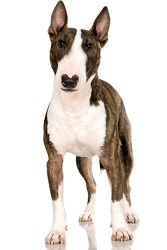 One of the oldest known breeds in England, the Bull Terrier is known as the gladiator of the dog world and rightly so, as it was bred to combat other dogs and animals for sport, a cruel practice that has been banned since the late 1800s.
One of the oldest known breeds in England, the Bull Terrier is known as the gladiator of the dog world and rightly so, as it was bred to combat other dogs and animals for sport, a cruel practice that has been banned since the late 1800s.
Today, the Bull Terrier is known as a loving, people-loving breed that displays all the characteristics of a terrier, including courage, independence and speed. With their cool-headed personality and robustness, they also come in a smaller size, known as Bull Terrier Miniature.
The Bull Terrier is a courageous, fun-loving and active dog, but not for everyone
Personality
This breed may look intimidating to some people, but the Bull Terrier is quite graceful and friendly. They love being around their humans and each has a unique personality all sharing the common trait of loyalty. They are very smart dogs, but can also act silly into their adult years.
The Bull Terrier is a very energetic breed that will require quite a bit of exercise, as they are exuberant.
Bull Terriers are fiercely protective of their owners, making them great watchdogs. However, if they are not trained to tame their possessiveness, they could become aggressive.
When it comes to training your Bull Terrier, positive reinforcement is the way to go. Training and socialization should commence from the early days as a pup and continue to maturity. It is important to set boundaries, especially around children as they will need to learn how to be assertive leaders to their Bull Terriers.
Upkeep
Generally a low-maintenance breed, the Bull Terrier sheds its smooth coat twice a year. However, a daily brush or rub with a comb glove will remove any loose hair. Bathing should be done every four to six weeks using a gentle dog shampoo, as their skin is quite sensitive. Extra care should be taken in the hotter months to apply sunscreen if the dog tends to be outdoors a lot.
Bull Terriers are quite vivacious and like keeping active. To burn off excess energy, a daily walk and play are advisable. If you are not at home and leave your dog alone all day, you may want to reconsider purchasing a Bull Terrier. These dogs enjoy the company of people and being left home alone all day may bring on separation anxiety and/or destructive behavior.
Like all dogs, Bull Terriers require regular tick, flea, intestinal worms and heartworm treatments. Consult your veterinarian on treatment options. Desexing and vaccination against diseases, such as the deadly parvo virus and highly infectious canine cough, are also important to discuss with your vet.
Compatibility
Bull Terriers can be wonderful with children if they are given the appropriate training – this applies to training both the dog and the child how to behave around one another. Like with all dogs, supervision is important with Bull Terriers around young children.
Bull Terriers are suitable for active people or families. It is not a good breed to have as pets for the elderly as they are quite strong and may be overpowering.
They do well as outside dogs as long as they get to spend lots of time with their family. They will need a secure backyard and protection from the summer heat and sun (they may be susceptible to sunburns), as well as the winter cold. They prefer spending time indoors with their owner – preferably sitting on your knee or on the couch.
Apartment living may not be the best for Bull Terriers, unless they get sufficient daily exercise.
Fact file
Breed classification Terrier
Size Medium to Large
Origin England
Lifespan 10 -12 yrs
Colors White, black, brindle, red and fawn.
Cost $1000+
Common hereditary problems Deafness, heart problems, kidney failure, luxating patella and skin allergies.
